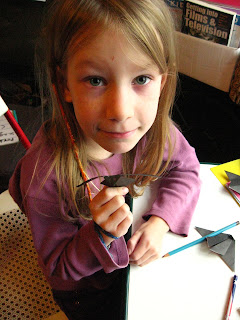Week 1 (ish): Moon phases
- Bribe children with chocolate biscuits to watch this
http://www.bbc.co.uk/schools/scienceclips/ages/9_10/earth_sun_moon.shtmlhttp://www.newtonsapple.tv/video.php?id=1671
- Look at our little plastic model of moon/earth and try to work out what the heck is happening. Or get dh to run around with a torch and a ball. (Definitely better to leave it to the physicist of the family)
(we started, saw the moon once, briefly, between clouds before it disappeared for three nights. How can the moon disappear? You'd have thought someone else might have noticed...
- Lunar eclipse: http://www.sciencedaily.com/videos/2007/0812-lunar_eclipse.htm
Listen to dh going on and on and on about lunar eclipses while we wonder how soon we can get away and eat the rest of the biscuits.
i.e. swinging an eraser by a piece of string and letting go without maiming anyone. Yeah. They'll love that one.
Week2 (ish): Tides and craters
[Not sure why those things go together, but it works for me.]
- Tides: http://www.ehow.com/video_5238520_moon-affects-changing-tides.html
http://lunar.arc.nasa.gov/education/activities/active15.htm
(need map/pictures of moon/craters; deep tray and the patience of a saint while children spill stuff all over the house)
and pretend that we are really a very culturally sophisticated family.
Week 3 (ish): The Sun
(short, so the kids might actually sit through it)
- Make a sundial - e.g. printout the pointer and base here:
http://www.bbc.co.uk/norfolk/kids/summer_activities/make_sundial.shtml
then move to a country where the sun actually shines at a strength that makes a sundial useable.
Week 4 (ish): The sun, day and night, seasons and other sun-ish stuff
- Sit kids in front of this video that shows a model of earth going round the sun while sneaking off to the corner shop to buy more chocolate biscuits.
http://www.classzone.com/books/earth_science/terc/content/visualizations/es0408/es0408page01.cfm?chapter_no=visualization
- Seasons. (btw, someone should put in a complaint to the met office that Britain was due a summer between June and August and it didn't turn up.)
http://www.metoffice.gov.uk/education/teachers/key-stage3/lessonplan-seasons/animation
Week 5(ish): Solar System
http://play.powerhousemuseum.com/makedo/pdfs/Mobile_Solar_System.pdf
This is where I spend 2 hours cutting out fiddly little shapes and sticking them together while the kids wander off...probably to eat more biscuits.
- Discuss the position of the planets. Or point the kids towards a book and make knowledgeable noises. Watch parts of The Planets series that I recorded years ago anticipating this very moment. Or take note of the kids' rolled eyes and lengthy sighs and get them to watch the (much shorter) videos here:
Mercury here: http://science.discovery.com/videos/space-school-mercury.html
Venus: http://www.cosmolearning.com/videos/venus/
Earth: http://science.discovery.com/videos/space-school-earth.html
Mars: http://www.cosmolearning.com/videos/mars/
Jupiter: http://science.discovery.com/videos/space-school-jupiter.html
Saturn: http://www.cosmolearning.com/videos/saturn/
Uranus: http://science.discovery.com/videos/space-school-uranus.html
Week6(ish): More Solar System
http://tlc.howstuffworks.com/family/science-projects-for-kids-the-incredible-universe9.htm
(need ball about 8 inches in diameter(football); 2 pins with small round heads; 1 pin with very small round head;2 peppercorns; 1 small walnut; 1 acorn; 2 peanuts; Index cards; Glue or tape; Bright markers; yardstick; Large park and some maternal enthusiasm. Latter might be in short supply.)
- Listen to some Holst The Planets,
e.g.
Mars: http://www.youtube.com/watch?v=L0bcRCCg01I
or get a CD from library. Then acknowledge that none of the kids are interested but go through the motions anyway, because, after all,
you are a home educator.
The End.






























